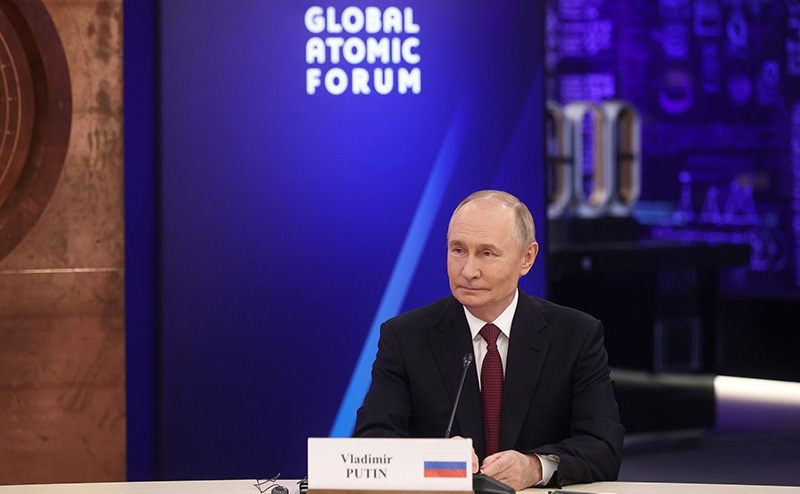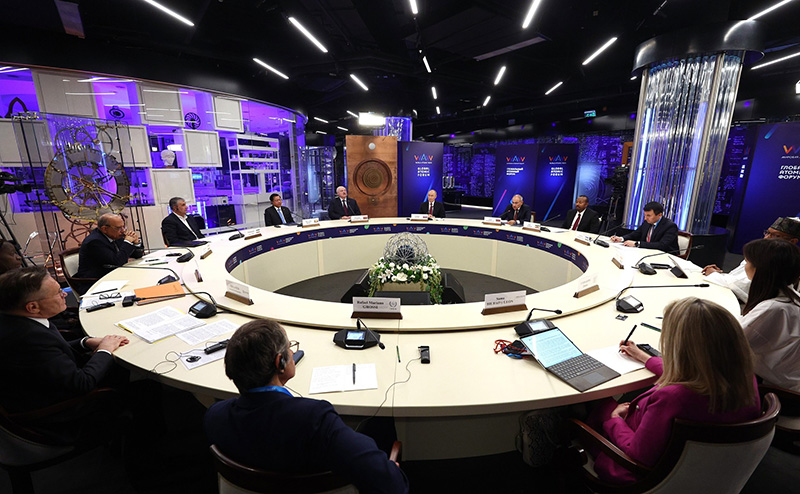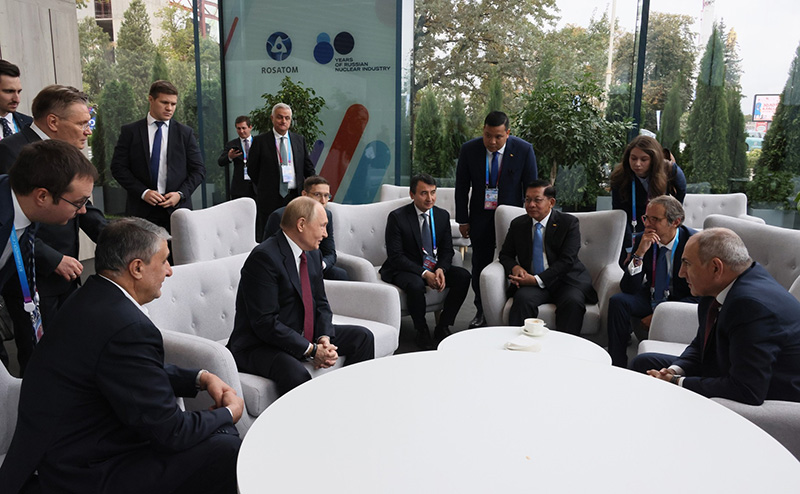 Vladimir Putin at the Global Atomic Forum.
Vladimir Putin at the Global Atomic Forum.
Photo: Kremlin.ru
Vladimir Putin addressed the Global Atomic Forum taking place at the Atom Museum at VDNKh, Moscow, September 25, 2025.
The Forum is being held as part of World Atomic Week, which marks the 80th anniversary of Russia’s nuclear industry and is themed “From a New Technological Paradigm to a New Worldview.”
Also attending the meeting were President of Belarus Alexander Lukashenko, Acting President of Myanmar Min Aung Hlaing, Prime Minister of Armenia Nikol Pashinyan, Prime Minister of Ethiopia Abiy Ahmed, Vice President of Iran Mohammad Eslami, Deputy Prime Minister of Uzbekistan Jamshid Khodjayev and Director General of the International Atomic Energy Agency (IAEA) Rafael Grossi, as well as the heads of relevant ministries from major partner countries and international organisations. The meeting was moderated by Alexei Likhachev, Director General of Rosatom State Corporation.
Before the event, the leaders toured the museum exhibits.
 Global Atomic Forum.
Global Atomic Forum.
Photo: Kremlin.ru
President of Russia Vladimir Putin:
Ladies and gentlemen, colleagues,
We are gathered here for the Global Atomic Forum. I am delighted to welcome the heads of state and leaders of international organisations, and I look forward to substantive discussions on a range of issues concerning the present and future of the nuclear industry.
This kind of dialogue is especially important at a time when a growing number of countries and large companies view peaceful nuclear energy as a vital resource for long-term, accelerated development. Public attitudes are also steadily evolving, with nuclear energy increasingly recognised as an environmentally friendly technology that offers enormous opportunities.
Clearly, there are fundamental reasons for this paradigm shift. These are not limited to the reliable solutions that underpin the creation of advanced nuclear power units. Another critical factor is the emergence of a fundamentally new technological paradigm, the widespread adoption of artificial intelligence, and the consequent need for significant energy resources to process colossal amounts of data.
Indeed, electricity consumption by data centres is set to more than triple in the current decade alone. In this regard, I would note that Russia is already deploying such modular data processing systems at its nuclear power plants, as they are best placed to provide a uniform, constant power supply.
The demand for green technology which minimises the impact on the environment and climate is another significant factor behind the surge of interest in nuclear energy. To reiterate, nuclear power plants are the key source of clean low-carbon energy. They surpass other energy sources in terms of cost, environmental performance, and the ability to provide stable generating capacity.
According to the IAEA forecasts, by mid-21st century, the total capacity of all nuclear power plants worldwide may increase by over 2.5 times to nearly 1,000 GW. Notably, the growth in demand for peaceful nuclear energy will be largely driven by the Global South and the Global East that are in the process of strengthening their technological and industrial potential.
We fully support the push for developing and using peaceful nuclear energy towards this end. We take pride in knowing that Russia is the only country around the world to possess expertise across the entire nuclear power technology chain. Thanks to their safety and resilience to external factors, nuclear power plants built to Russian designs are the most sought-after internationally.
In addition, we are developing small-scale land-based and floating nuclear power plant projects. Just now, the head of Rosatom told us about this [during a tour of the ATOM Museum exhibition]. Very soon, we will start their serial production.
Our principled approach ensures Russia’s leadership. First, we strictly honour our contractual obligations. I want to emphasise this. We fulfill all our obligations entirely regardless of political circumstances.
Second, we reject “technological colonialism” and do not make our partners dependent on Russian technical solutions. On the contrary, we help them establish their own sovereign national nuclear industries, including personnel training and the creation of competence centres. We enlist local companies, assist in the operation of power units, and ensure the supply of nuclear fuel and waste management.
More than that, we share our experience and knowledge in building other advanced industries of the 21st century, such as nuclear medicine, digital systems, electric transport, and innovative materials. As a result, we help our partners make a genuine development leap, bring their economies to a whole new level of efficiency, and ultimately improve quality of life.
All of this represents an important public and social dimension of our work, a visible confirmation of the fact that equal access to technology, including in the sphere of peaceful nuclear energy, can ensure dynamic yet fair and sustainable global development.
Colleagues,
We view peaceful nuclear technologies as the foundation for extensive international cooperation and for fostering closer ties among nations. Russia is keen on establishing stable, long-term conditions for projects within the nuclear sphere.
Foremost, the absolute priority for our country is ensuring nuclear safety and the physical protection of nuclear facilities and installations, regardless of their location.
Therefore, it is imperative to further enhance safety and reliability requirements at every stage of the nuclear cycle, including uranium extraction, reactor operation, and the management of spent nuclear fuel and radioactive waste. Furthermore, regulation in this sphere must be carefully calibrated to maintain a balanced approach between the development of peaceful nuclear energy and the strengthening of the nuclear non-proliferation regime.
Moreover, it is evident that the construction of nuclear power plants requires significant funding, which necessitates a balanced distribution of risks and benefits among the key participants in such projects – states, investors, and consumers. I consider it essential to develop modern financing models for the construction of nuclear power plants and to involve international financial institutions and development banks in these undertakings.
In this context, I would add that earlier this year, the New Development Bank established by the BRICS countries confirmed its readiness to finance nuclear projects, while at the end of last year, on Russia’s initiative, a BRICS coordination mechanism – the Nuclear Energy Platform – was established.
A crucial issue is the long-term resource provision for nuclear power plants. To utilise peaceful nuclear energy sustainably, fundamentally new and more efficient technologies are required, and Russia is already engaged in developing such solutions.
Just before this session began, my colleagues and I were exchanging views informally before entering this hall. In this connection, I would also like to note that, according to OECD estimates, all uranium resources under an optimistic scenario will be fully depleted by 2090. This amounts to approximately eight million tonnes. However, in practice, this could occur as early as the 2060s. That is, this could happen very quickly – right before our eyes.
Given that a quarter of uranium reserves are found in deposits where uranium is a by-product, by 2030 – here I come to what I believe Russia can truly be proud of – we plan to launch in the Tomsk Region the world’s first nuclear power system with a closed fuel cycle. What does this mean? It is, in the full sense of the word, a revolutionary development made possible by our scientists and engineers. What does it mean in practice? It means that almost the entire volume – 95 percent of spent nuclear fuel – will be reused in reactors more than once. This mechanism will, in the long term, make it possible to virtually eliminate the problem of radioactive waste accumulation and, which is also extremely important, essentially remove the issue of uranium supply.
I should note that the full range of advanced materials for the closed fuel cycle will be tested at the International Research Centre now being established in the Ulyanovsk Region. We invite scientists from different countries to cooperate in developing technologies that, without exaggeration, open a new era in nuclear energy.
Friends,
Our meeting – the Global Nuclear Forum – is timed to coincide with two landmark dates: the 80th anniversary of the national nuclear industry, and Nuclear Industry Worker Day, which is marked in our country on September 28.
Let me remind you – my colleagues and I have just discussed this, but I want to say it once again for a wider audience – the first decision in the Soviet Union on the development of nuclear energy was taken on September 28, 1942, during the Great Patriotic War, when the outcome of perhaps the most dramatic phase of that war – the Battle of Stalingrad – was still unknown. The battle was still on, yet the State Defence Committee decided to launch the work on uranium, and the work got going.
I would like to sincerely congratulate Russia’s nuclear industry workers, scientists, and former employees on the industry’s anniversary and the upcoming professional holiday. Without a doubt, I extend my congratulations to the forum’s guests – specialists from former Soviet republics – who are united by the traditions of the great Soviet Ministry of Medium Machine- Building. These traditions must certainly be continued.
I wish you new, great successes for the benefit of the people of our countries and, without exaggeration, all humanity.
Thank you for your attention.
 Before the Global Atomic Forum.
Before the Global Atomic Forum.
Photo: Kremlin.ru
read more in our Telegram-channel https://t.me/The_International_Affairs

 21:01 25.09.2025 •
21:01 25.09.2025 •






















